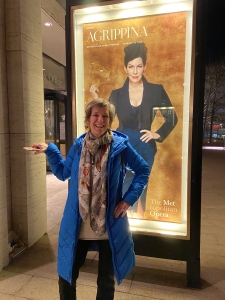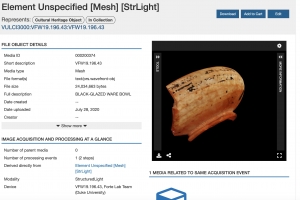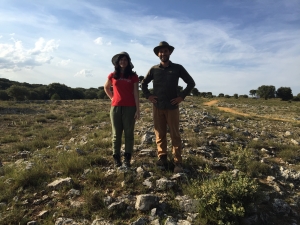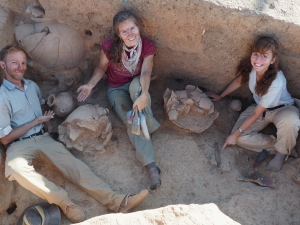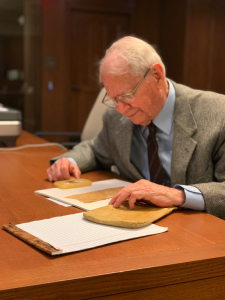Jed Atkins
"I spent the last academic year on sabbatical. I spent the Fall in Princeton, New Jersey, where I was a Visiting Associate Professor in the Politics Department and a Visiting Fellow with the James Madison Program. One highlight of our stay in New Jersey was attending a Penn State Football game with my family, an activity that I did with some frequency growing up in Central Pennsylvania. Much like attending a basketball game in Cameron Indoor, seeing a football game in Beaver Stadium with 105,000 fans is a unique experience. I also taught a course for the Princeton Politics Department on Classical Political Theory (“From Athens to Augustine”) and gave a number of invited lectures and seminars in Princeton, New York City, New Haven, and Brunswick, ME. The last talk was especially meaningful, because it meant a return to my alma mater, Bowdoin College. My children were especially excited to spend Halloween trick-or-treating in Maine.
"Spring found us back in Durham, NC. I was able to get much writing done on my next book, provisionally called The Christian Origins of Toleration, and I hope to complete the manuscript within the next year. I have also had a number of articles appear in the last year: “Integrity and Conscience in Medical Ethics” (Perspectives in Biology and Medicine), “Tertullian on ‘the Freedom of religion’” (Polis), “Espoir et empire dans le Songe de Scipion” (Les Cahiers Philosophiques), and “Leo Strauss’s Lucretius and the Art of Writing.” This final essay was dedicated to the memory of my dear friend and mentor Diskin Clay, and it appeared in Euphrosyne, a collection in his memory edited by my colleagues Peter Burian and Gregson Davis (along with Jenny Strauss Clay). Finally, in May, Cambridge released a paperback edition of Cicero on Politics and the Limits of Reason."
Mary T. (Tolly) Boatwright
"My last year before retirement was a doozy! In F19, the second half of my presidency of the Society for Classical Studies, I taught a reduced load of one course. The 13 students in this 1st-year seminar on the imperial women of Rome were ingenious and inspiring. Among many indeligible memories are their Taylor Swift GIF for Agrippina the Younger; depiction of the dense family trees of Claudius and Messalina; and sensitive presentations of ‘first ladies’ Livia, Abigail Adams, and Melania. Spring 2020 started well with my regular Roman History course, this time with 23 lively undergrads and our grad student Leo Trotz-Liboff as my TA, and a graduate seminar on the later Roman principate. But then: the pandemic. Duke’s resilient and smart students rose to the challenge of remote teaching, however. The graduate seminar resulted in thoughtful and provocative papers, despite being cut off from the library. The undergraduate class wrote some of their strongest material! It is fun to realize how significantly my teaching of that intro Roman History has changed over my time at Duke. Uxorious Claudius still figures in my class, but students learn and debate about him and his entire familia in very different ways than in spring 1980. I am so happy to have spent my career at Duke, where constant change, challenges, and dedication to excellence are steadfastly supported by colleagues and administration. On that side I add that it was a privilege to participate in our successful hiring of four new colleagues this year, as well as to have served as interim DUS 2019-20.
"Current talks and research represent three interests. In September my “Imperial Women of Rome, and Billy B. [Boatwright], Queen of the Book Fair,” at the Stonington Free Library of the childhood town in Connecticut, helped me finish revisions for Imperial Women of Rome: Power, Gender, Context. ThMyat book, to be published by Oxford University Press in 2021, has been strengthened by research assistance from wonderful graduate students, maps from the Ancient World Mapping Center at UNC-CH, and genealogical trees devised by Zihan Chu, who was in both my undergrad courses this year. Also in September I gave at Elon University “The Jewish Revolts against Rome: Exceptional, or To Be Expected?,” in which Hadrian loomed large. In October at the University of Michigan, Ann Arbor, where I had received my PhD in 1980. I offered the illustrated lecture “Agrippina: ‘I, Me, Mine’?” This was an initial foray into my biography of Agrippina the Younger.
"In January 2020 Agrippina figured in a different talk, my Presidential Address to the Society for Classical Studies. “What Would Agrippina Do?” will appear in TAPA 150.2 (2020). It reflects events and changes during my year as the 2019 President of SCS as well as my own research and thoughts about Classical Studies now. While fostering the deeply humanistic value of Classics, we must meet the legacies of past injustice and the potential for a more equitable present and future."
Peter Burian
"Life in this plague year seems strange in many ways, but since I am no longer teaching and managed to set myself up to work at home just before the library locked down, my life has not changed as it much as it might have, although I deeply regret the social isolation that has affected us all.
"My work continues to focus on two main projects. Closest to seeing the light, after an absurdly long gestation, is a Companion to Aeschylus for Wiley-Blackwell, co-edited with our former colleague Jacques Bromberg, now at Pitt. We expect to present the completed manuscript to the publishers by the end of October, and it will be an enormous relief to have got that far, though of course there will still be editorial work to do into the new year.
"The other big project, also moving forward at a glacial place, though I hope it will pick up speed when the Companion is in press, is my book on the symbiosis of fifth-century Athenian theater and the democratic regime. The argument in a nutshell is that drama in Athens is inherently democratic, and what makes it so is best understood, not by treating it as a response to its political environment, as if commenting from the outside, but rather by analyzing the multifarious and even contradictory ways in which it inhabits and participates in that environment—from trenchant critique of democratic practice to thought experiments that extend it to those excluded from it in Athenian reality. A novelty in this analysis is the inclusion of both tragedy and comedy. I gave a paper at the virtual CAMWS conference this spring using the odd couple of Sophocles’ Ajax and Aristophanes’ Knights to exemplify the underlying ideas behind the project.
"Euphrosyne: Studies in Ancient Philosophy, History, and Literature in Memory of Diskin Clay, which I edited in collaboration with Jenny Strauss Clay (UVa) and our own Gregson Davis, was published this year by De Gruyter as Volume 370 of Beiträge zur Altertumskunde. My contributions to the volume are an introductory essay on “Diskin Clay, the Scholar and the Man,” an article “Just on the Far Side of Language: On the Possibility (and Impossibility) of Translating Aeschylus,” and a translation of two sonnets by the Italian early romantic poet Ugo Foscolo, chosen for subjects that call Diskin to mind. Eighteen distinguished scholars and writers, friends of Diskin all, contributed to a book that represents the great variety of our late colleague’s interests. Duke participants include Jed Atkins in addition to Gregson and myself.
"Finally, I want to say how happy it makes me to see the department renewing itself with the appointment of four exceptional young women in a single year. William Johnson is to be congratulated for engineering this unprecedented feat. William is going on to be the new Dean of the Humanities—virtue is its own punishment, as my grandfather used to say. Actually, having been there briefly myself, I think he is ideally suited for the job and expect he will find it exciting and fulfilling."
Cassandra Casias
"Hello! Allow me to introduce myself. My name is Cassandra Casias, and I am thrilled to be joining Duke’s Classical Studies Department as an Assistant Research Professor. I am a Roman historian with a Ph.D. in History from Emory University (2019) and an M.A. in Classics from the University of Colorado at Boulder (2013).
"My research centers on families and domestic slavery in the Roman provinces. My dissertation, “Bishops and Other Men’s Wives in the Later Roman Empire,” examines household sexual and power dynamics through the sermons and letters that fourth- and fifth-century bishops addressed to the families in their congregations. My article, “The Vulnerable Slave-Owner in Augustine’s Sermons” appeared in the Journal of Late Antiquity (2018). I am currently writing about enslaved wet-nurses in Roman Africa.
"I am a Chicana from Pueblo, Colorado, with a large extended family. My interests include helping marginalized and low-income student populations navigate the unwritten cultural expectations of academia in the United States. I have tutored such students in my hometown through Upward Bound, a federally funded college preparatory program.
"I look forward to getting to know the Duke community, and I hope to meet many of you soon!"
Gregson Davis
"The most salient event during the past year in my lengthy academic career has been my second (and final!) retirement, which occurred on June 30th, 2020. Emeritus status has wrought for me a bitter-sweet reshaping of my working life: on the one hand, I will miss initiating students into the delights of Greco-roman and Caribbean poetry; on the other, I will cherish the opportunity to devote more time to research and writing, and to completing some of those opera minora that have been shelved over the past few decades.
"On the research front: I have been involved in the labor of co-editing (with Sergio Yona) a collection of essays on Epicureanism in the late Republic and early Empire for OUP. Concurrently, two of my own contributions to similar volumes on the same subject have finally made their slow journey into print: translations (with exegetical notes) of a small selection of Horatian odes for the memorial volume in honor of our late colleague, Diskin Clay (my co-editors of the project are Peter Burian and Jenny Strauss Clay, and Jed Atkins is a contributing author); and an essay that distills an overview of Epicurean “conversations” with the “Garden” in the poetry of Vergil and Horace (for the Oxford Handbook of Epicureanism, ed. Phillip Mitsis).
"As I write, I am going through the somewhat stressful process of evacuating my office. As you can imagine, I have accumulated many archaeological sediments of course materials in a career that began at Stanford University in 1966; the task of radically reducing the huge cache of documents is both emotionally taxing and a logistical nightmare. My consolation is that I will be sharing new office space in the department with my dear Emeriti colleagues, Peter Burian and Francis Newton, and I plan to maintain unbroken contact with my other colleagues and grad students, new as well as old.
"I retire under the grim shadow cast by the COVID-19 pandemic and the gloom of a toxic assault on the American democratic polity ("Turning and turning in the widening gyre," in the words of W.B.Yeats); however, I take heart in the new activism of the younger generation that reminds me of the idealistic milieu of the 60s when I began my teaching career as a grad TA in Classics at UC Berkeley."
Maurizio Forte
"The COVID 19 changed our life and very sadly canceled also my entire archaeological fieldwork activities for the summer 2020 and the impact on University research was devastating. I spent most of my research time on the study of the Etruscan and Roman material from Vulci, in Italy, and I am working on the publication of the first extensive report. Despite the lock down and the impossibility to use my lab facilities at Duke since March 2020 (because of the COVID emergency), I was able to win a research fellowship from the Etruscan Foundation which allowed me to coordinate and sponsor from US a research team in Italy. In addition I got the sponsorship of two companies for the use of a structure light 3D laser scanner (RangeVision) and of a laser aided profiler (LAP) on site.
"This research team of archaeologists and digital scholars (all post-doc) worked in Vulci (under my remote supervision) during the summer 2020 in order to digitize over 700 archaeological Etruscan and Roman finds in 3D. Finally we implemented all the archaeological database for Morphosource 2.0 a new open source project-based data platform developed at Duke University. This platform is particularly innovative because it combines digital repositories, archives, 3D libraries, models, metadata and virtual reality tools in the same digital environment. In addition, the Morphosource 2.0 (to be released in the Fall 2020) will be specifically focused on cultural heritage objects and archaeological excavations. Vulci will be the first case study in archaeology worldwide. In particular in this pandemic period, the availability of 3D archaeological repositories and scientific databases opens endless perspectives for research and teaching."
Lauren Ginsberg
"My name is Lauren Donovan Ginsberg and I’m delighted to be joining the department of Classical Studies, especially in such a big cohort of new faculty. My research looks at early Imperial Latin literature (primarily drama, epic, and historiography) and its contribution to how Romans remembered their past. I am particularly interested in the idea of civil war and how various genres attempt to confront and express the trauma of the civil war experience. Historical poetry holds a special place in my heart, not least because I think its contribution to Rome’s cultural memory is often underrecognized. I also have a fondness for the reception of Nero in modern popular culture and have quite an absurd collection of “Nero kitsch” that anyone visiting my office can see. Outside of research and teaching, I have been active in the theater community in Cincinnati from participating in panel discussions before or after a given production and working with local theater groups on classically-themed productions to larger-scale events like organizing a production of Bryan Doerries’ Theater of War project for the Tri-state area. I look forward to exploring these and totally new arenas in Durham!"
Alicia Jiménez
"During 2018 and 2019 our team received funding from the Provincial Government of Soria (Diputación de Soria, Spain), the Gerda Henkel Stiftung (Germany) and Duke’s Arts & Sciences Council to create a new map of the Roman Camps near Numantia (Renieblas, Spain), one of the earliest and best- preserved in the Mediterranean. A plan of Camp III (49 hectares), drawn then by topographers from the German army under the supervision of historian Adolf Schulten at the beginning of the 20th c., has been key for our current understanding of the basic structure of the Roman Republican army for almost 100 years. It is usually assumed that the archaeological remains clearly correspond to the description of the arrangement of a manipular army by Polybius (book 6, 2nd c. BCE) and how different ranks of soldiers were housed inside a typical camp. A LiDAR hillshaded Digital Terrain Model (DTM) and a hillshaded digital surface model (DSM) of the site at a high resolution were created in 2018 in collaboration with D. Hernández (Universidad de Castilla La Mancha). In 2019 and 2020, despite delays due to the COVID pandemic, we were able to complement the photogrammetry of 345 ha (which included the 5 camps and surroundings) and the airborne LiDAR model with images taken by two types of terrestrial laser scanners, data from an extensive field survey and the study of historical photographs and archaeological maps. Graduate student A. LoPiano, joined our team during the field survey of Camp III in the summer of 2019 (pictured). A preliminary comparison of Schulten’s map, published in 1929 and our new model has already shown a series of discrepancies that have the potential to provide a novel interpretation of the structures preserved in this important site for the history of the Roman Empire. Our new findings together with the most relevant results of Duke’s project at Renieblas (2015-2019) were presented first at an “open doors day” at Renieblas, and later at a session on the Roman army in the West that I organized at the Annual Meeting of the Archaeological Institute of America (Washington, January of 2020). The session included papers about some of the most important Roman camps of the western provinces (Alesia, Vindolanda, Camps at the German-Raetian limes), by archaeologists from Canada, England, Germany and France. A paper about the outcomes of our project at Renieblas, including an study of a series of artifacts in archaeological context (ceramic, fragments of arms and armor, coins), faunal remains and dated organic samples (charcoal and bones) using C-14 will be published in a major archaeology journal in the Fall. This academic year I have also written a reaction piece to a debate article by M. Fernández-Götz et al. entitled “The dark side of the Empire: Roman expansionism between object agency and predatory regime” (Antiquity, in press) and a review of P. Kobusch’s book Die Grabbauten im römischen Hispanien: zur kulturellen Prägung der Sepulkralarchitektur (JRA 32, 2019).
"I was fortunate to work with a Bass Digital Education Fellow (F. Scarappati) to add new visualization tools, including a ThinkLink pilot license, to my course on Roman spectacles in the spring of 2020. Last, but not least, I have been reviewing this summer the syllabi of my fall semester courses to include anti-racist teaching materials and reflect, with the students, on the political dimension of archaeology."
Kate Morgan
"Hello, Duke Classics, and friends! My name is Kate Morgan, and I am excited to be joining the Duke department and the broader archaeological community of the Research Triangle. I identify first, and strongly, as a field archaeologist; my expertise lies in the eastern Mediterranean and Near East in the Bronze and Iron Ages (roughly the 2nd–1st millennia BCE). Though Athens was my first (archaeological) love, I have excavated most recently in Cyprus, and have worked for much of my career in Turkey, in both central Anatolia, where I conducted dissertation research at the Iron Age citadel of Gordion, and southeastern Turkey—technically speaking, at the interface of the Anatolian plateau and the North Syrian plain—where I am Assistant Director of the Chicago-Tübingen Expedition to Zincirli. I come to Duke after two years as Postdoctoral Fellow of the Oriental Institute of the University of Chicago, having taken my doctorate in Art and Archaeology of the Mediterranean World from the University of Pennsylvania in 2018.
"One of the things I most love about archaeology is that it allows me to explore a broad range of research interests, and to collaborate with people from many walks of life and areas of expertise (as I do every year at Zincirli, where I hope to add Duke students to the mix as soon as international travel regulations allow!). My current focus is the completion of an edited volume on political performances and audiences in the ancient world, stemming from a conference on the subject I organized at the University of Chicago in 2019. But my recent publications and presentations are on topics ranging from the social contexts of textile production, to the emergence of wine as a luxury commodity in Bronze Age trade networks, and the use and abuse of monumental sculpture and architecture in Iron Age Anatolian urban centers. At the broadest level, I’m interested in practices that contribute to community formation, especially in culturally or ethnolinguistically diverse contexts: how people use objects to construct their identities for themselves, project them to others, and communicate across difference; how they engage with and reinvent the material remains of the past to help make sense of their present; and how architecture and monuments shape, reshape, and are shaped by people’s experience of the world, and each other. There are, of course, contemporary circumstances that make these issues feel very acute to me, and I seek out, in my research and my teaching, subjects that resonate well beyond the specific contexts that I know best. For that reason and more, I very much look forward to learning from and collaborating with the diverse members of the Duke Classics community."
Francis Newton
"In November, nine years after the Team began working on this subject, Medicine at Monte Cassino: Constantine the African and the Oldest Manuscript of his Pantegni, by Erik Kwakkel and Francis Newton, with Introduction by Eliza Glaze, was published by Brepols. This summer, together with Prof. Benjamin Lee of Oberlin and Prof. Eliza Glaze of Coastal Carolina University, I am teaching a course / engaged in a research project, the Oberlin Articella Project, with Oberlin undergraduates; see https://www.oberlin.edu/news/teaching-new-normal-study-medieval-medical…. At the (virtual) meeting of the Society for Classical Studies in January 2021, in the session on Ovid, I will present a paper, 'Ovid's Council of the Gods (Met.1) and Jupiter's Tribunicia Potestas.'"
Erika Weiberg
"My name is Erika Weiberg and I am thrilled to be joining the department of Classical Studies at Duke alongside such brilliant faculty and students. A little about myself by way of introduction: my research focuses on feminist approaches to Greek literature and trauma studies. My current book project is called Theater of the Home Front: Wives of Returning Veterans in Greek Tragedy, and it argues that tragedies about a soldier’s homecoming dramatize the emotional experiences and trauma of soldiers’ wives at home. I have also published several articles and book chapters on trauma and Greek tragedy. Although I am joining the faculty at Duke after a stint in Florida at Florida State University, I am no stranger to the Triangle. I received my PhD in 2016 from the University of North Carolina at Chapel Hill, so coming to Duke feels in many ways like a welcome homecoming (although to a very different shade of blue). I can’t wait to reunite with old friends and meet new ones in the wider Duke Classical Studies community."
Everett Wheeler
Everett L. Wheeler, Scholar in Residence (Ph.D. 1977), gave a lecture, “Parthians in the Roman Army,” at UCLA’s Pourdavoud Center for the Study of the Iranian World on 15 January 2020.
Clare Woods
"My fourth year as Director of the Thompson Writing Program has been another busy one, not least when we made the move to remote teaching in March. Fortunately, both the classes I was teaching in Spring were relatively small: a group of twelve students in my travel themed Writing 101 section, and a small but select bunch of Latinists in my undergraduate Medieval Latin class. Students in both classes would have worked on materials in the Rubenstein's collection for their final projects. Instead, we explored some of the wealth of material digitized online, and I think we managed the transition pretty well. My Latin class also seemed to enjoy annotating Latin texts on screen as we puzzled them out together in Zoom classes. Although busy with the TWP, I was delighted to participate in the search for our new Classical Studies hires this year. There was a lot of reading, an entire week spent interviewing candidates, and a fantastic line-up of seminars and job talks (and delicious dinners) this Spring. I learned a lot, and am excited to work with our new colleagues in the years to come. My own research projects are progressing. I gave a paper entitled "Books on the Road: Exploring Material Evidence for Social Networks in the Early Middle Ages" to a joint AIA/SCS panel in D.C. in January 2020. Since then, I have focused predominantly on my analysis of the Rubenstein Library's heavily annotated incunable edition of Pliny the Elder's Natural History. The talk I would have given on the humanist marginalia in that volume to Durham University's inaugural History of the Book Conference in March was postponed due to COVID. I participated instead in an online mini conference in June, presenting some preliminary findings in a short paper entitled, "Student Notes, Florilegium, or Commentary in the Making? A Glimpse into the Margins of an Early Printed Pliny." I look forward to seeing our early printed Pliny face-to-face again, as well as my colleagues (new and old) and all our students. My best wishes to everyone - stay well!"

